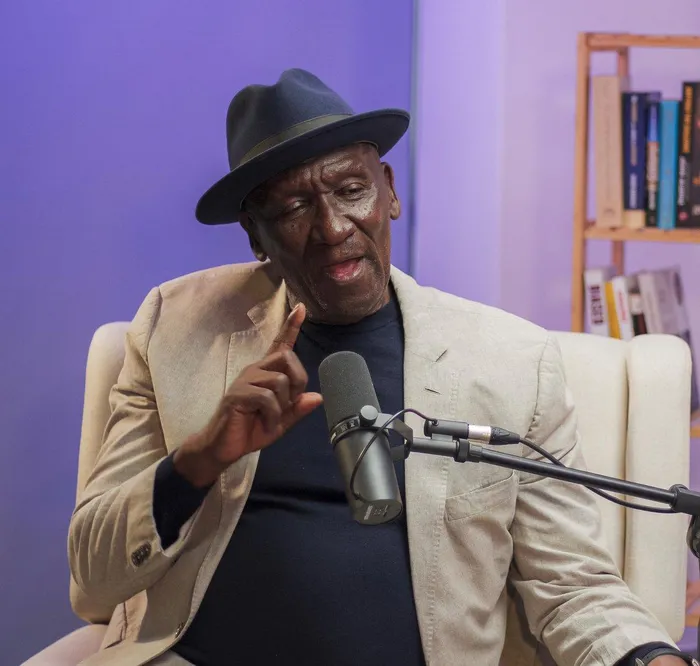‘Crime is planned from prison,’ says former police minister Bheki Cele

Former Police Minister has disclosed that South Africa's violent crime is planned from within prisons by inmates serving life sentences.
Image: X/@SizweMpofu-Walsh
Former Police Minister Bheki Cele has made a shocking revelation, claiming that most of South Africa's violent crime is being planned and organised from behind bars by inmates serving life sentences.
“Most of the crime is planned from prison,” Cele said during an interview on the Sizwe Mpofu-Walsh Xperience (SMWX) podcast.
“The people that are doing life sentences, they run crime outside.”
Cele, who served as Minister of Police from 2018 to 2024, said correctional facilities have become a place where criminal syndicates are coordinating illicit activities beyond prison walls.
“Correctional facilities themselves are, in some ways, reproducing crime,” he said.
“One day I was phoned by a guy in prison who refused to tell me who he was. He warned me that a chief was going to be killed in Ulundi. He gave me names, the lodge, and everything.”
Cele said he passed the information to KwaZulu-Natal Police Commissioner Nhlanhla Mkhwanazi.
“When Mkhwanazi got there, he found exactly what the caller had described. That came from someone inside prison,” he said.
Cele also said the Wellington Prison, Mthatha in the Eastern Cape is known as a planning centre for conflicts in the taxi industry.
“That’s a big problem. The case of Thabo Bester was high-profile, but there are many like him. Not just escapees, people who are still inside, sending out plans,” he said.
He added that addressing crime in South Africa requires more than just empowering the police.
“You can't just strengthen the police. You need to strengthen the entire criminal justice system,” Cele said.
Cele, who served as National Commissioner of Police from 2009 to 2011 before being removed in 2012 over misconduct allegations, said crime statistics during his leadership were significantly lower.
“Go study the crime stats from 2009 to 2012. They came down. Not just by numbers, South Africans said they could sleep with their doors open,” he said.
He credited the drop in crime to strategic collaboration during preparations for the 2010 FIFA World Cup.
Cele said they created the Tactical Response Team, known as the ‘AmaBherethe,’ after a cash heist in Pretoria where two men and women in blue were killed.
“Police at the scene couldn’t pursue suspects driving high-performance vehicles in their standard-issue Corollas,” Cele said.
He said the TRT served as a buffer between regular police stations and elite units like the National Intervention Unit and the Special Task Force.
“We bought GTIs and BMWs for the unit. We strengthened the force. At the time, we had about 195,000 police officers for a population of 50 million,” Cele said.
But after leaving office in 2012, Cele said many of these initiatives were dismantled.
“When I returned in 2018, South Africa had grown to 60 million people, but the police officers had declined to 184,000…We had lost 15,000 officers,” he said.
He said after that, he then approached President Cyril Ramaphosa to fund the training of new officers in three cycles of 10,000 every year, which restored the police numbers to 2010 levels.
Cele lamented the declining morale in the police force, adding that in a month during his tenure, about 312 officers resigned.
“I called some of them to ask why. One warrant officer told me, ‘When my daughter was born, I was a warrant officer. She’s a graduate now, and I’m still a warrant officer,’” Cele said.
Cele said meaningful crime reduction will require more community engagement.
“I don’t care how many police you put on the street, if communities aren’t part of safety and security, we won’t win,” he said.
“These criminals are sons and husbands of people who live in those communities.”
He expressed concern over South Africa’s rates of gender-based violence (GBV).
“In just three months, 10,000 women are raped. Half of them are raped in their own homes, by their brothers, stepfathers, or other family members,” Cele said.
“Where are the police when a sibling rapes a sibling?”
Cele also blamed undocumented immigrants as a serious concern.
“The worst part is, when they commit crime, they are untraceable and can easily disappear. That poses a major challenge,” he said.
He said the entire security cluster needs to be strengthened to address the scale and complexity of South Africa’s crime crisis.
“There’s still a lot of work to do,” he said.
IOL News
Related Topics: